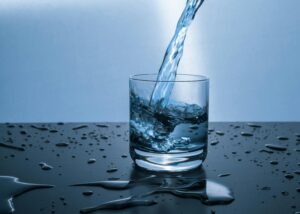Water is a fundamental component of our bodies, playing a crucial role in maintaining overall health and well-being. Proper hydration affects everything from physical performance and cognitive function to skin health and digestion. Despite its importance, many people struggle to consume an adequate amount of water daily, leading to various health issues. This article explores the profound impact of hydration on health and provides guidelines on how much water you need to stay optimally hydrated.
The importance of hydration for overall health
Staying hydrated is essential for maintaining optimal health and well-being. Water plays a crucial role in numerous bodily functions, making it a fundamental requirement for our survival. From regulating body temperature to aiding digestion and transporting essential nutrients, proper hydration is vital for the smooth operation of our physiological systems.
Adequate water intake is necessary for the efficient functioning of our organs and tissues. Water helps to cushion and lubricate our joints, protect our sensitive organs, and maintain the elasticity of our skin. It also plays a crucial role in the elimination of waste products and toxins from the body, reducing the risk of kidney stones and other urinary tract issues.

Moreover, hydration has a significant impact on our cognitive function and mental well-being. Studies have shown that even mild dehydration can lead to fatigue, headaches, and difficulty concentrating. Conversely, staying well-hydrated can enhance mood, improve memory, and boost overall brain function. By prioritizing our hydration needs, we can optimize our physical and mental performance, ultimately supporting our overall health and quality of life.
How much water does the body need?
The recommended daily water intake can vary widely depending on individual factors, such as age, gender, activity level, and overall health. The general guideline is that adults should aim to consume between 11.5 and 15.5 cups (2.7 to 3.7 liters) of fluids per day, with women typically needing slightly less than men.
However, these numbers are not set in stone, as our water requirements can fluctuate based on various factors. For instance, individuals who engage in regular physical activity or live in hot, humid climates may require more water to maintain proper hydration levels. Conversely, those with sedentary lifestyles or who reside in cooler environments may need less.
It’s important to note that the recommended water intake includes not only drinking water but also fluids from other sources, such as juices, milk, and even some solid foods. While water is the best choice for hydration, other beverages and water-rich foods can also contribute to our overall fluid intake. By being mindful of our fluid consumption throughout the day, we can ensure that we are meeting our body’s hydration needs.
Factors that affect water intake requirements
Several factors can influence an individual’s water intake requirements, including age, gender, activity level, and environmental conditions. Understanding these factors can help us better assess our personal hydration needs and make adjustments as necessary.
Age plays a significant role in determining water intake requirements. Infants and young children have a higher water-to-body-weight ratio and require more frequent hydration. As we age, our thirst mechanism may become less sensitive, making it crucial for older adults to be proactive about their fluid intake.

Gender is another factor that affects water needs. On average, men tend to require more water than women due to their larger body size and higher muscle mass. However, pregnant and breastfeeding women have increased fluid requirements to support the needs of the developing fetus or nursing infant.
Physical activity level is a crucial factor in determining water intake requirements. Individuals who engage in regular exercise or physically demanding work often need to consume more fluids to replace the water lost through sweating. The intensity and duration of the activity, as well as the environmental conditions, can all impact an individual’s hydration needs.
Signs of dehydration and the dangers of not drinking enough water
Dehydration occurs when the body loses more fluids than it takes in, leading to an imbalance in the body’s electrolyte and fluid levels. Recognizing the signs of dehydration is essential for addressing the issue promptly and preventing more severe health consequences.
Some of the most common signs of dehydration include thirst, dark yellow or infrequent urination, fatigue, headaches, dizziness, and dry mouth or skin. In more severe cases, individuals may experience muscle cramps, rapid heartbeat, confusion, and even organ dysfunction.
Failing to address dehydration can have serious health implications. Prolonged dehydration can lead to a range of issues, including kidney stones, urinary tract infections, heat exhaustion, and even heatstroke. In extreme cases, severe dehydration can result in life-threatening conditions, such as organ failure or hypovolemic shock.
By being aware of the signs of dehydration and taking proactive steps to maintain proper hydration, we can mitigate the risks and protect our overall health. Regular water intake, along with a balanced diet and proper management of physical activity, can help us avoid the potentially dangerous consequences of dehydration.
Benefits of staying hydrated
Maintaining proper hydration levels offers a wide range of benefits for our physical and mental well-being. From improving cognitive function to supporting cardiovascular health, staying hydrated can have a profound impact on our overall quality of life.
One of the primary benefits of hydration is its ability to enhance cognitive performance. Studies have shown that even mild dehydration can lead to decreased concentration, impaired memory, and reduced problem-solving abilities. Conversely, staying well-hydrated can improve mood, increase alertness, and boost overall brain function.

Proper hydration also plays a crucial role in supporting cardiovascular health. Water helps to regulate body temperature, maintain blood volume, and facilitate the transport of oxygen and nutrients throughout the body. Adequate hydration can lower the risk of heart disease, stroke, and high blood pressure, making it an essential component of a healthy lifestyle.
Hydration also supports efficient metabolism and weight management. Water is necessary for the body’s metabolic processes, including the breakdown and utilization of nutrients. Staying hydrated can help to curb appetite, increase energy expenditure, and reduce the risk of water retention and bloating.
Tips for increasing water intake throughout the day
Incorporating more water into our daily routine can be a simple yet effective way to improve our overall health and well-being. By adopting a few strategic habits, we can ensure that we are meeting our body’s hydration needs throughout the day.
One of the easiest ways to increase water intake is to carry a reusable water bottle with you and make a conscious effort to sip from it regularly. Set reminders or alarms to prompt you to take regular water breaks, and try to replace sugary or caffeinated beverages with water whenever possible.
Another helpful tip is to infuse your water with fresh fruits, herbs, or vegetables to enhance the flavor and make it more appealing to drink. Experimenting with different combinations, such as lemon and cucumber or strawberry and mint, can make staying hydrated more enjoyable.
Incorporating water-rich foods into your diet can also contribute to your overall fluid intake. Fruits and vegetables like watermelon, tomatoes, and spinach are excellent sources of hydration, providing both water and essential nutrients. Incorporating these foods into your meals and snacks can help you stay hydrated while also supporting your overall health.
Other sources of hydration besides water
While water is undoubtedly the best choice for hydration, there are other beverages and food sources that can contribute to our overall fluid intake. Understanding the hydration potential of these alternative options can help us diversify our hydration strategies and ensure that we are meeting our body’s needs.
Milk and 100% fruit juices are excellent sources of hydration, as they contain a significant amount of water and essential nutrients. Herbal teas and broths can also provide hydration while offering additional health benefits. However, it’s important to be mindful of the sugar and calorie content of these beverages and consume them in moderation.

Water-rich fruits and vegetables, such as watermelon, cucumbers, and tomatoes, can also contribute to our overall fluid intake. These foods not only provide hydration but also deliver a wealth of vitamins, minerals, and other beneficial plant compounds that support our health.
It’s worth noting that while these alternative sources of hydration can be beneficial, they should not entirely replace water consumption. Water remains the most essential and efficient way to maintain proper hydration, as it is free of calories, additives, and other potentially harmful substances. Incorporating a variety of hydration sources can, however, help to make staying hydrated more enjoyable and sustainable in the long run.
Common misconceptions about hydration
Despite the well-established importance of hydration, there are several common misconceptions that can lead to confusion and suboptimal hydration practices. Understanding and dispelling these myths can help us make more informed decisions about our water intake and overall health.
One common misconception is that the recommended water intake of 11.5 to 15.5 cups per day is a one-size-fits-all rule. In reality, individual water needs can vary significantly based on factors such as age, gender, activity level, and environmental conditions. It’s essential to listen to our body’s cues and adjust our water intake accordingly.
Another myth is that we can rely solely on thirst as an indicator of our hydration needs. While thirst is a useful signal, it is often a late indicator of dehydration. By the time we feel thirsty, our body may already be in a state of fluid imbalance. Proactively drinking water throughout the day, rather than waiting for thirst to set in, is a more effective approach to maintaining proper hydration.
Some people also believe that caffeinated or alcoholic beverages can contribute to overall hydration. While these beverages do contain water, they also have diuretic properties that can ultimately lead to fluid loss and dehydration. It’s essential to consume these beverages in moderation and to prioritize water as the primary source of hydration.
Hydration and exercise: How to stay hydrated during workouts
Maintaining proper hydration is particularly crucial for individuals who engage in regular physical activity or exercise. During exercise, the body loses significant amounts of water and electrolytes through sweating, which can lead to dehydration and impair physical performance if not addressed.
The amount of water needed during exercise can vary depending on the duration and intensity of the activity, as well as environmental factors such as temperature and humidity. As a general guideline, it’s recommended to drink 16 to 24 ounces (0.5 to 0.7 liters) of water for every hour of moderate-to-vigorous exercise.
To ensure optimal hydration during workouts, it’s essential to start with a well-hydrated state by drinking water before, during, and after physical activity. Carrying a water bottle with you and taking frequent sips can help you maintain proper fluid levels throughout your workout. Additionally, replenishing electrolytes lost through sweat, such as sodium and potassium, can be beneficial for endurance athletes or those exercising in hot, humid conditions.

By prioritizing hydration during exercise, you can not only improve your physical performance but also reduce the risk of heat-related illnesses, such as heat exhaustion or heatstroke. Staying hydrated can also aid in recovery, helping to reduce muscle soreness and fatigue after intense workouts.
Conclusion
Proper hydration is a fundamental aspect of overall health and well-being. By understanding the importance of water for our body’s functions, the factors that influence our hydration needs, and the strategies for staying hydrated, we can take proactive steps to optimize our health and prevent the detrimental effects of dehydration.
Maintaining adequate water intake can have far-reaching benefits, from enhancing cognitive performance and supporting cardiovascular health to aiding in weight management and promoting efficient metabolism. By making hydration a priority in our daily lives, we can improve our physical and mental well-being, ultimately leading to a higher quality of life.
Remember, the recommended water intake is a general guideline, and our individual needs may vary. Pay attention to your body’s signals, experiment with different hydration strategies, and find what works best for you. By staying hydrated, you can unlock the true potential of your health and thrive in all aspects of your life.


